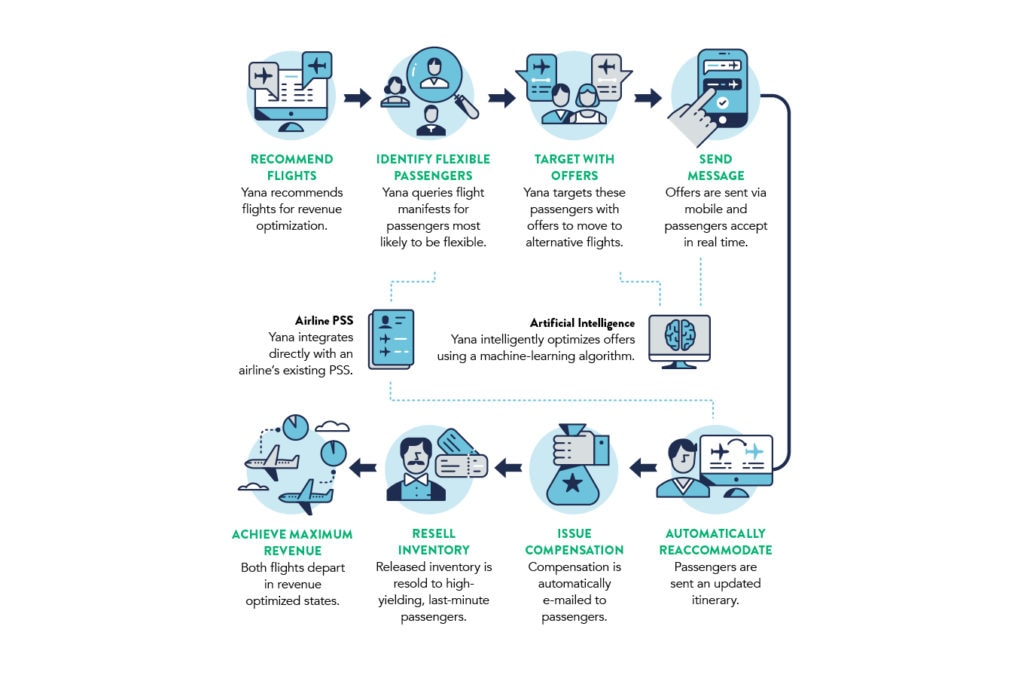How one company’s repositioning aims to rebalance passenger loads and optimize seat revenues across the skies.
That breakfast is the most important meal of the day likely isn’t lost on Azim Barodawala, CEO of Volantio, an Atlanta-based travel and technology startup. In early 2016, he and his two business partners had already achieved success with SmartAlerts, a dynamic e-mail-marketing system for airlines. But one morning over a latte, poached eggs and some sourdough with former colleague Kevin Ger at the airport Hilton in San Francisco, Barodawala realized that with a little shuffling, things could be even better.
With integration into airline pricing and availability, and a communications platform, SmartAlerts had inadvertently put all the pieces in place to address a much bigger challenge: network capacity optimization. As Ger observed, Barodawala and his team could use their technology to proactively identify flexible travelers on high-demand flights, communicate offers to switch to lower-demand flights, and automatically rebook them if they accepted.
“People will be flexible for the right incentive. We’ve seen situations where customers have been willing to push their reservation by 32 hours in order to get an upgrade.” – Azim Barodawala, Volantio
Volantio’s solution, a web-based platform called Yana that leverages machine-learning algorithms to match flexible travelers with alternative offers, has already gained significant traction. After seven months in market, they closed a $2.6-million Series B funding round in February, which included investments from JetBlue Technology Ventures, Qantas Ventures and IAG. SunExpress and Scoot are the latest to join a growing tally of Yana-platform adopters, among them Alaska Airlines, Qantas, Iberia, Volaris and IndiGo.
Rearranging Revenue: How Volantio’s Yana Works

Done right, the platform offers a win-win proposition. For tweaking their itineraries, flexible travelers score frequent flyer miles, vouchers or upgrades, and the airline can resell the ticket at a higher cost. The automated platform also alleviates the strain put on call centers and operators caused by rebooking demands.
“People will be flexible for the right incentive,” Barodawala says. “We’ve seen situations where customers have been willing to push their reservation by 32 hours in order to get an upgrade.” If that J-class seat was flying empty in the first place, the cost of incentive remains low, while the benefit margin widens. Eventually, Barodawala says, the plan is to collect enough data to be able to make personalized offers to travelers.
Offers are typically sent to flex travelers on mobile phones, but depending on the airline or the region, another channel might be used. “In Japan, you need to be on [social network] Line,” Barodawala says. For Volaris, the team went down to one of the airline’s call centers in Mexico to learn how to communicate with travelers in the right vernacular for the region.
Adaptation and rearrangement has been in Volantio’s DNA since its inception. Even the company name is the result of a shuffling of letters sorted by a word generator. “We chose letters that could have roots related to aviation or flying, but very broadly,” Barodawala says. As luck would have it, the name they ended up with contains the word “volant,” which fittingly has three meanings: having wings extended, flying or capable of flight, and quick and nimble.
“Doing the Shuffle” was originally published in the 8.4 August/September issue of APEX Experience magazine.


